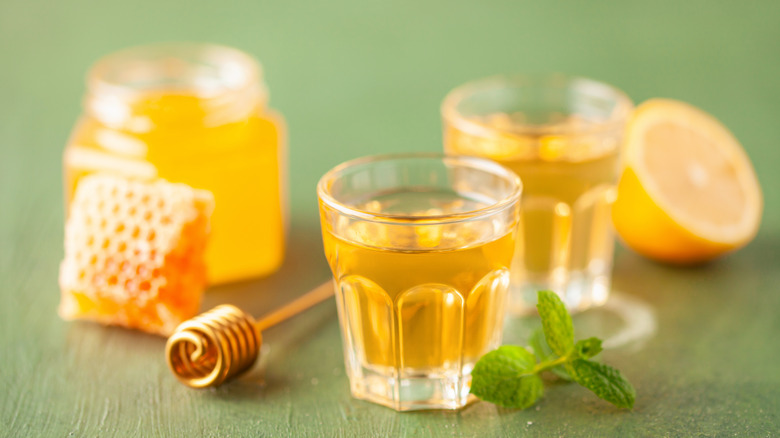Why Mead Fell Out Of Popularity And How It Could Make A Comeback
Mead might very well be one of the world's oldest alcoholic drinks, but unless you frequent Renaissance fairs or boast a taste for craft beverages, it's not very likely that you've had the pleasure of indulging in this fermented honey concoction. After being consumed for centuries by practically every ancient civilization, including the Romans, the Vikings, and the Mayans, mead fell out of favor around the 16th century. Fortunately, thanks to a growing number of local brewers and the environmental benefits of mead, it looks like it is finally primed for a resurgence.
Chief among the reasons for mead's lapse in popularity is it was very difficult to make compared to other boozy options. Collecting honey meant dealing with bees in a time when equipment to do so safely barely existed. Harvesting wheat to brew beer or grapes to make wine was less complicated. Furthermore, due to the sudden increase in trade routes and colonialism, sugar from the West Indies emerged as a readily available and easy-to-obtain alternative to honey.
Combine these logistical elements with the fact that mead no longer retained any cultural significance in countries like the United Kingdom, which influenced the rest of the world's cultures, and mead quickly became a drink of the past. However, after being overlooked for centuries, mead now has a rather bright future.
Mead is an attractive option for eco-conscious drinkers
Crops like barley, hops, and grapes can only flourish in certain environments, which often means a lot of fuel must be used in order to transport the resulting beer and wine around the country, or even across the world. Honey, on the other hand, has very few requirements in terms of where it can be produced. So, with the right equipment (and the proper liquor licenses), you could potentially sell mead made from the honey you harvested in your own backyard.
Additionally, the process of making mead involves supporting bees. These little bugs are vital for maintaining our environment as they pollinate everything from wildflowers to the grains that will someday become feed for farm animals. Bee populations have been declining for decades, which is why beekeeping is so important: it keeps them in our ecosystem.
The accessibility modern beekeeping equipment provides means that producing the honey needed to make mead is easier than ever before. Local meaderies are popping up all over the country to offer tasty, sustainably made mead. On top of that, mead features heavily in popular fantasy movies and television shows, such as "Game of Thrones," which has inspired many to give it a taste. So, the next time you're in the mood for a drink, try a bottle of mead and find out why the ancient Greeks thought of it as "the nectar of the Gods."

